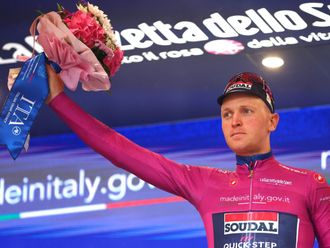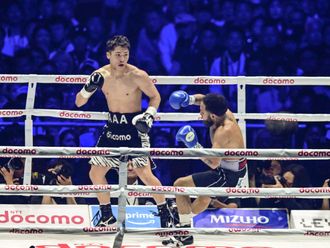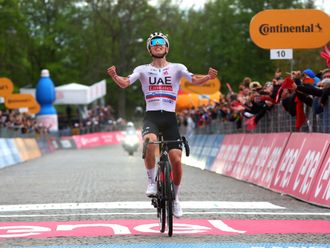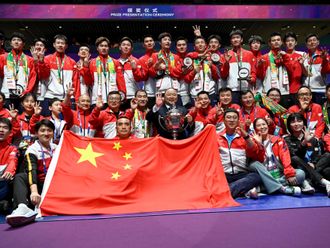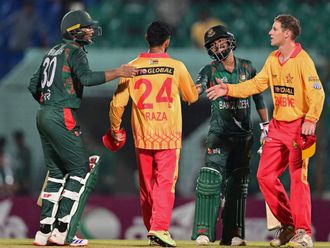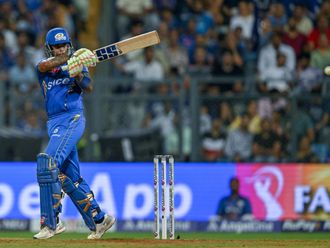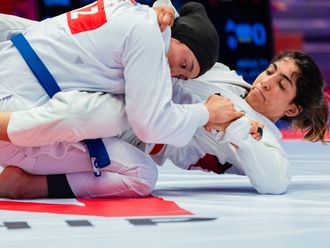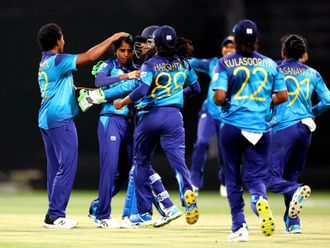Paris: Lance Armstrong should be handed back his seven Tour de France titles, according to 12 of the 25 surviving winners of cycling’s biggest race.
As this year’s Tour reached the Rhone-Alpes region of eastern France on Wednesday, with an 11th stage from Besancon to Oyonnax, the Dutch newspaper De Telegraaf published the results of a survey it conducted with the surviving winners of the race. Only Ferdi Kubler and Roger Walkowiak failed to respond, and of the remaining 23 more than half were of the opinion that the disgraced American should be rewritten into the history books.
“Armstrong should stay on that list,” said the Irishman Stephen Roche, who won the Tour in 1987. “In the 100-year history of the race you can’t have a winner for seven years.
“Doping has been part of sport, not only for cycling, for decades. Who tells me Jacques Anquetil won clean. Should we take his victories away? Or why does Richard Virenque get to keep his polka dot jerseys?”
After years of denials and lawsuits, Armstrong was eventually brought down when the United States Anti-Doping Agency published its so-called reasoned decision, in which it accused the seven-time champion and his US Postal team of “the most sophisticated, professionalised and successful doping programme that sport has ever seen”.
Armstrong, who had already been issued a lifetime ban from all sports that adopt the World Anti-Doping Agency code and stripped of his seven Tour titles, subsequently confessed.
Older generation
Those who felt that Armstrong should keep his titles were generally of the older generation, riders such as Felice Gimondi, Federico Bahamontes, Jan Janssen and 1980 winner Joop Zoetemelk. “They should never have erased Armstrong from the list. You can’t change results 10 years on. Of course it’s not good what he did but you can’t rewrite history,” Zoetemelk said.
Of the more recent winners only Andy Schleck and Oscar Pereiro felt Armstrong should keep his wins, with Schleck, who won his 2010 title after Alberto Contador tested positive, saying: “Who remembers who was second in those races? I wouldn’t know myself. You can’t have seven races without a winner, so just leave Armstrong on the list.”
British winners Chris Froome and Sir Bradley Wiggins have both spoken out numerous times on this issue and they, like Australian Cadel Evans, are adamant that the Armstrong years (1999-2005) should serve as a reminder to current riders. “Those seven empty places symbolise an era. We should leave it like it is,” said Froome. Both Evans and Wiggins added that sending back the yellow jerseys might a symbolic gesture.
Armstrong himself was contacted by De Telegraaf for a reaction but said he would “keep it to myself for now”.
There seems little chance of the 42-year-old being reinstated. Tour director Christian Prudhomme said that public opinion would not allow it. “You ask the people along the route,” he said. “It’s clear, his name will not be on the list again. Period.”
Brian Cookson, the president of the UCI, has long encouraged Armstrong to speak to the independent commission [CIRC] set up to investigate cycling’s doping past. The Englishman said in a recent interview that he did not know whether Armstrong had yet done so. Cookson did admit, however, to errors in the UCI’s handling of the recent controversy over Froome’s use of a Therapeutic Use Exemption for corticosteroids to treat a chest infection during his Tour of Romandy win earlier this year. Although the UCI’s decision to grant the TUE was given the all-clear by Wada, it later emerged that the TUE was signed off by just one man, rather than by a committee of experts, as recommended by Wada. Cookson said: “We’ve reinforced and reinvigorated the process. And I accept that we needed to do that.”
11th stage winner
Meanwhile, Tony Gallopin won the 11th stage of the Tour de France on Wednesday and then said it was even better than wearing the leader’s yellow jersey.
The 26-year-old Frenchman had not thought life could get any better than Sunday when he snared yellow for a day from Vincenzo Nibali, thus earning the honour of wearing it on Bastille Day.
But he said this victory at the end of the 187.5km stage from Besancon to Oyonnax had topped that.
“It’s different because I’d thought about the yellow jersey for five days and all day during the stage [on Sunday] and then the reward arrived,” said the Lotto-Belisol rider.
“But here I didn’t believe I would do it until the last 100 metres. I thought I’d be caught so the feeling and the joy is greater for a stage win.”
American Andrew Talansky, meanwhile, quit the Tour de France before Thursday’s 12th stage due to the cumulative effects of several crashes, his Garmin-Sharp team said.
Talansky crashed heavily on Friday’s seventh stage before also coming off his bike the next day.
The 25-year-old had suffered badly on Monday’s tough mountainous stage in which he lost 10 minutes and saw his overall hopes go up in smoke.
But following Tuesday’s rest day, the Criterium du Dauphine winner woke up with a bad back and suffered terribly on Wednesday’s 11th stage, coming home alone and more than 32 minutes behind winner Tony Gallopin.
“I’m absolutely heartbroken to leave the Tour de France. I built my season around the Tour,” said Talansky in a team statement.
“I had hoped the rest day would allow some time to recover from my crashes. I was hopeful that I could get through yesterday [Wednesday]... but it proved to be too much.”
— Telegraph Grouo Limited, London 2014 (With Inputs from AFP)


